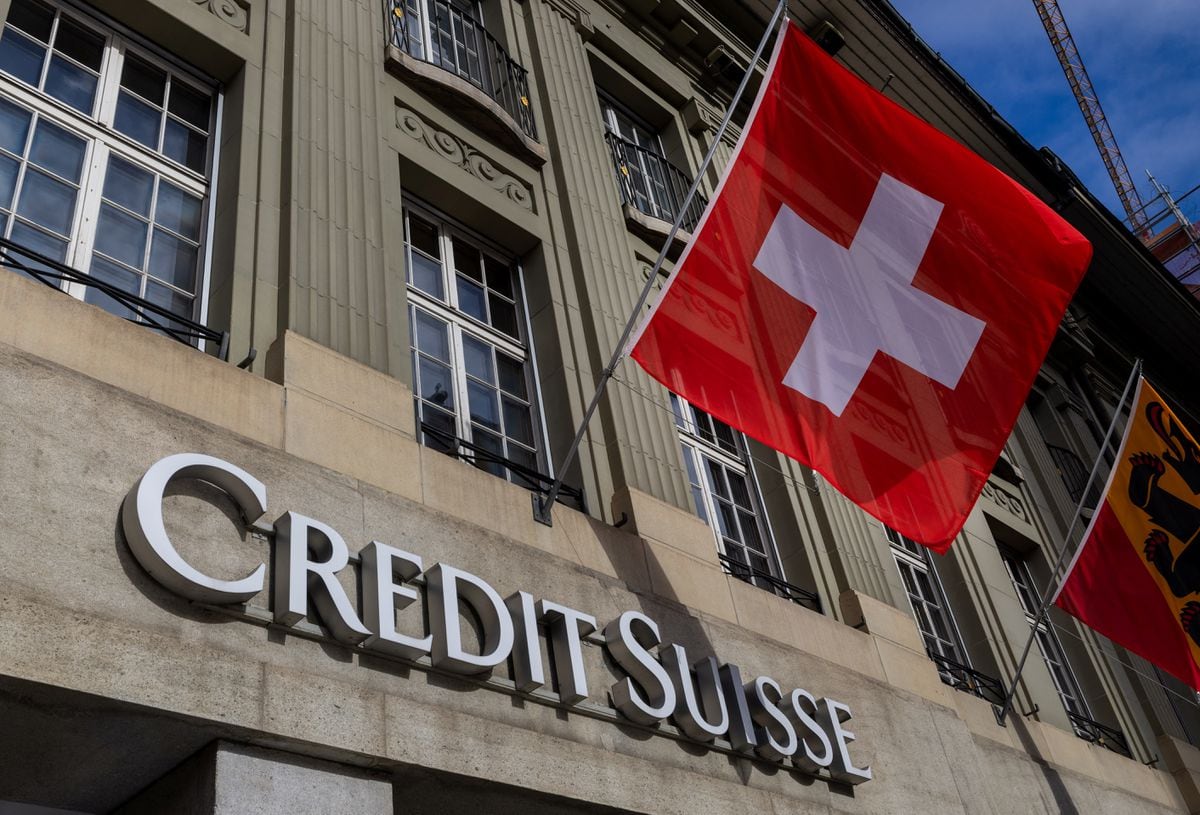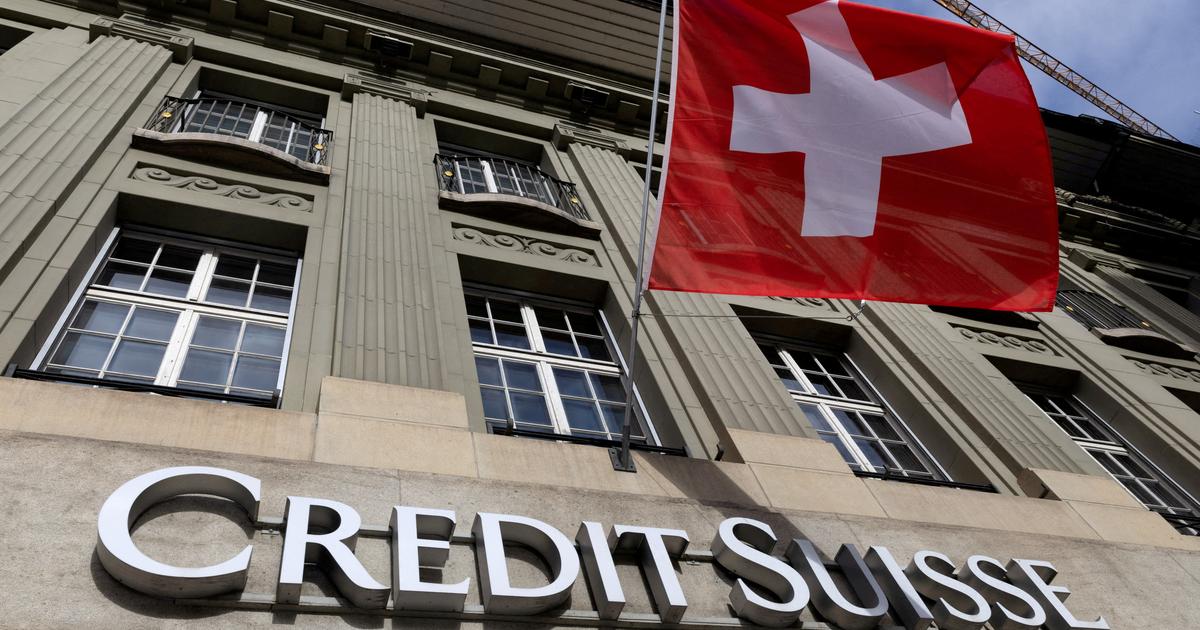Banking is once again a sector under suspicion.
The fall of two regional entities in the United States dealt a first blow to financial institutions around the world last week.
The most reassuring messages then repeated that it was a particularly flagrant case of mismanagement, and that there was no risk of contagion.
Now the aftershocks come from the heart of Europe, from battered Credit Suisse.
Its largest shareholder, Saudi bank SNB, has said it will not provide more capital if needed.
Without that parachute, the bank is doomed to fly over the financial panic on its own wings, shorter and more fragile than ever after years of scandals, fines and bad decisions that have weighed down its share price to the point of turning it into a shadow of its former self.
Investors make blood of this weakness this Wednesday: its capitalization is around 7,000 million euros after its shares fell 24% at the close of the session.
And they flee both from the Swiss franc and from everything that smacks of ATMs and branches: the French Société Générale and BNP Paribas, and the Spanish Sabadell exceed 10% decrease;
the Germans Commerzbank and Deutsche Bank 9%, and the Americans JPMorgan, Citigroup and Wells Fargo collapsed around 5% on a black Wednesday for all banks on both sides of the Atlantic.
The main Spanish index,
The moment for the opening of a new crisis front could not be more inopportune.
US authorities are trying to stabilize the financial system by guaranteeing the deposits of Silicon Valley Bank and Signature Bank clients, no matter how much they had, bypassing the $250,000 insured limit because anything else would have encouraged contagion.
A handful of US regional banks remain under pressure and it is not ruled out that the snowball will lead to new victims.
The words of the US president, Joe Biden, assuring that no one will lose their savings, have not served to completely stop a vicious circle, that of fear and mistrust, difficult to stop once it starts up.
Volatility continues for First Republic Bank, PacWest Bancorp and a few others.
On Friday it seemed that his downfall was imminent;
on Monday, they rebounded as if everything had been a passing nightmare, and this Tuesday they returned to the red.
The prospects, in any case, do not seem positive.
The
Financial Times
reports that large banks such as JPMorgan and Citigroup are receiving a veritable deluge of deposits from small and medium-sized banks.
Bad news for those who assumed that the firewalls deployed by the Federal Reserve, the Treasury Department and the regulators would put an end to the problems with a stroke of the pen.
Although the Biden Executive seems willing to use all its weapons to protect deposits, the most prudent clients transfer their money to the so-called
too big to fail
—too big to fail—, that is, those with such systemic importance that it would be unthinkable that they would not be bailed out in the event of turbulence.
Will the smaller ones resist this flight of funds?
Will there be new regulatory requirements that reduce the flow of credit in circulation?
Pimco analysts are not optimistic about the knock-on effects to come.
"These events may very well lead to a recession," they warned this Wednesday.
The price of a barrel of Brent oil reflected these renewed fears with falls of 5%, and the dollar, a traditional refuge value, strengthened nearly 2% against the euro.
More information
The specter of another financial crisis haunts the world
The seriousness of the matter has reached Lanzarote, where the Spanish president, Pedro Sánchez, has appeared together with his Portuguese counterpart, António Costa.
Speaking to the media, he has sought to break any parallels with the events of 2008 that led to the Great Recession, now that comparisons to the Lehman Brothers cataclysm resound again.
He first highlighted that Europe has a strengthened supervision system that it did not have in those days, and then he highlighted that both European banks and especially Spanish ones have above-average liquidity and solvency ratios.
That does not mean, he explained, that you have to be carried away by complacency.
"I think there is a message of calm, but also of prudence and close monitoring of these financial tensions."
The new plague, Credit Suisse, accumulates in just three years a history of nonsense as long as it is painful to enumerate.
It was the entity most affected by the
Archegos case
, with an estimated loss of 5.3 billion dollars, after displaying poor risk control by lending exorbitant amounts to an investment firm that lost everything.
Tidjane Thiam resigned from his CEO position in 2020 for being implicated in an espionage case, and Portuguese António Horta-Osório left the entity's presidency in January 2021 after an investigation determined that he breached pandemic restrictions.
It was fined by Brussels for forming a forex cartel with other banks, and by the US SEC after its employees, like those of other banks, used WhatsApp for business purposes, banned for not being traceable later.
And a large-scale leak revealed that he had personalities linked to dictatorships as clients,
corrupt politicians and members of organized crime.
This same Tuesday he acknowledged in his 2022 annual report having detected a “material weakness” in the internal control of his financial information.
Last October, its default insurance already shot up due to doubts about its solvency, between restructuring announcements and a capital increase of 2,220 million to attract resources.
His managers spent a whole weekend calling investors to calm things down.
But things have only gotten worse with each result they present: they lost 7,381 million in 2022.
One of the few good news in that bottomless pit that the bank has been digging due to its own demerits seemed to come at the end of last October, when the Saudi National Bank entered its capital buying 9.8% of the shares.
New money to bring some order to the chaos.
Now, he says that he will not continue to increase his position, which leaves him more unprotected and he has once again triggered his default insurance, waiting to see if the Swiss National Bank sends any public message of support, as they have been asked from the entity, according to the Financial Times.
With all these precedents, it cannot be said that its precarious situation is a surprise.
This is how Arcano economist Leopoldo Torralba explains it.
“Like Silicon Valley Bank (SVB), Credit Suisse is another example of a poorly managed bank.
In the past it made horrible risk decisions, and it has nothing to do with the average profile of the European bank, just as the SVB has nothing to do with the average American bank”.
The market, however, is not discriminating.
Banking is a deeply interconnected sector where trust is essential.
Therefore, this Wednesday the falls were fed back in all European and North American entities, regardless of size, risk profile or their greater or lesser solvency.
"We continue to believe that it is normal for this to generate uncertainty due to the memory of the Great Recession and because the rise in rates is not known who else may be affected, but we do not believe that it is something systemic," Torralba points out.
Follow all the information on
Economy
and
Business
on
and
, or in our
weekly newsletter
Subscribe to continue reading
Read without limits
Keep reading
I'm already a subscriber












